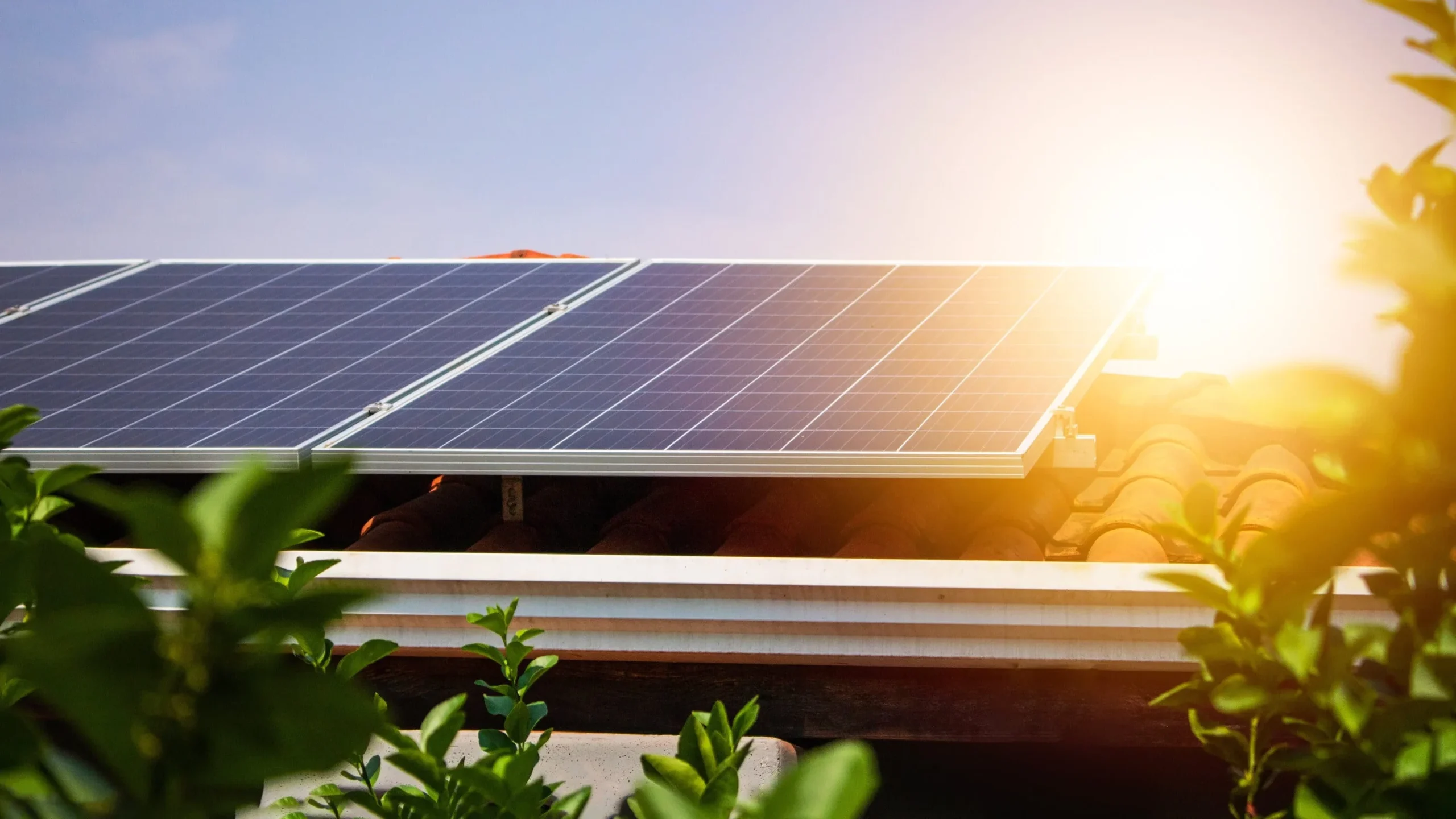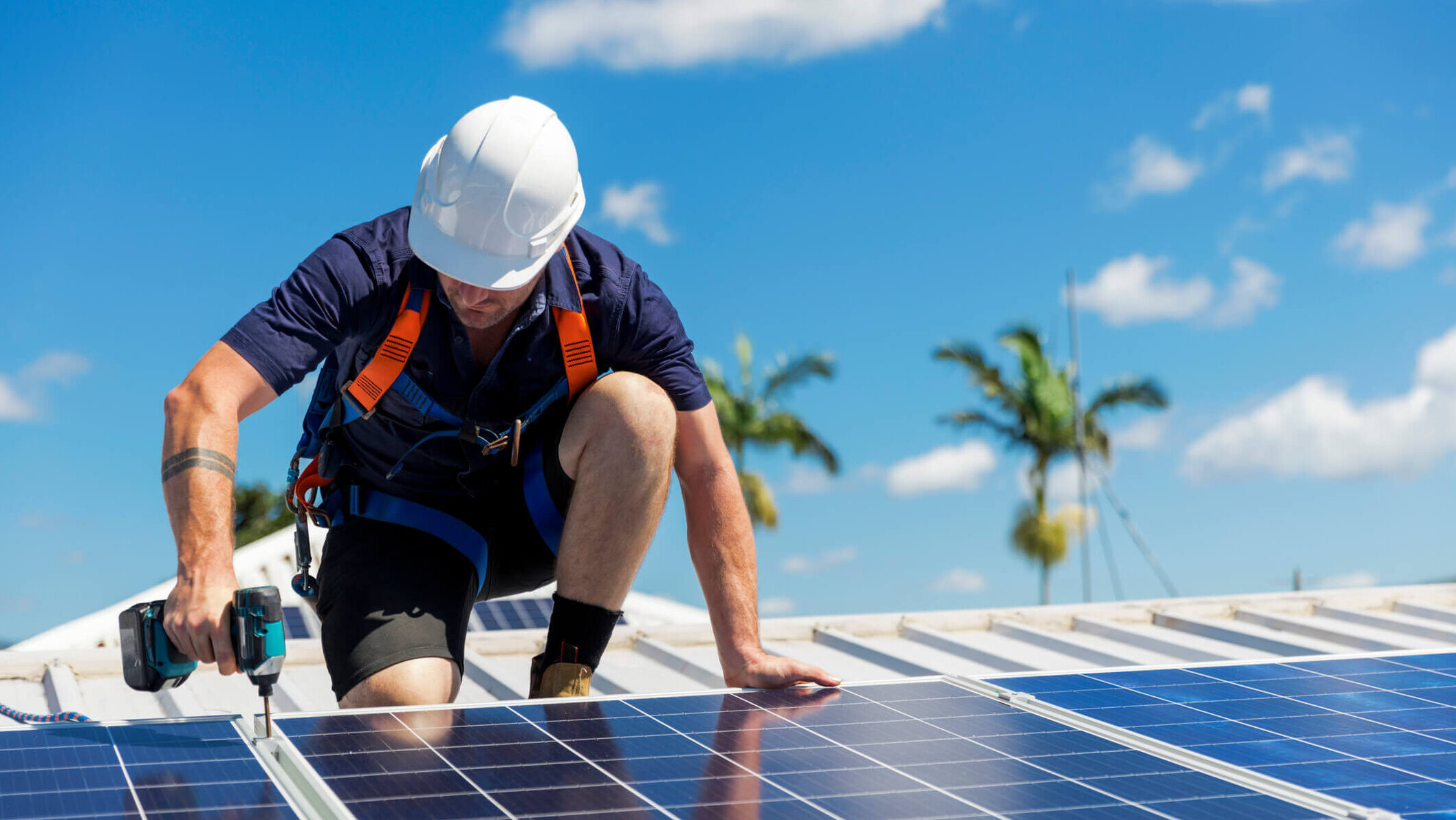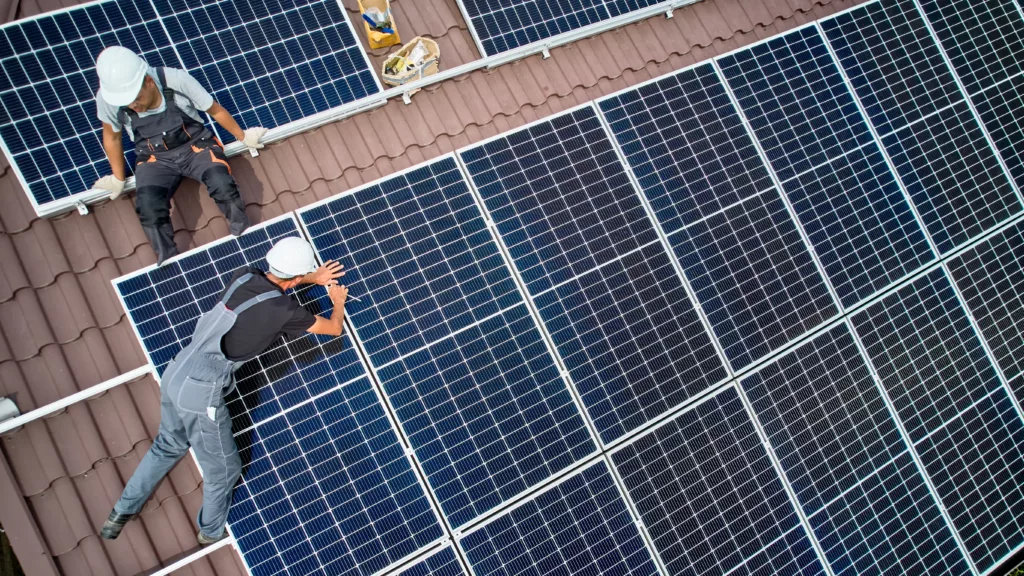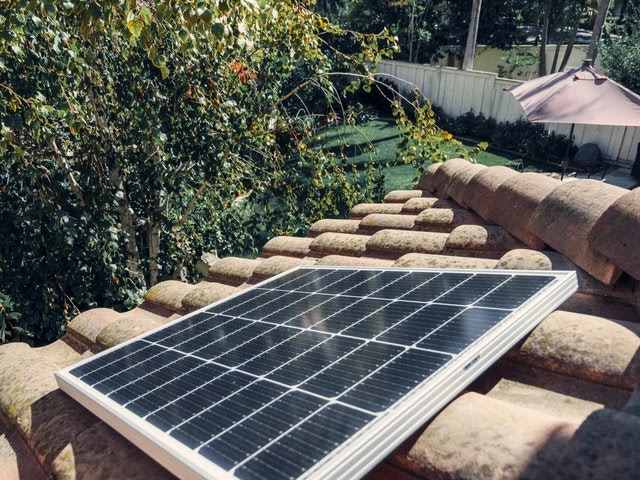Florida homeowners can claim a variety of tax incentives and rebates when installing solar panels. This makes it easier for everyone to enjoy the many benefits of solar power.
Here’s how Florida solar incentives can help you go solar today!
Key Takeaways
- Solar panels offer a wide range of benefits for Florida homeowners.
- You can avoid the high price tag of solar by using Florida-approved solar programs and incentives offered to homeowners by the state.
- Because of these incentive programs, reaping the benefits of solar power is easier than ever.
Federal Solar Incentives

Federal Solar Tax Credit
The primary Florida solar incentive is the federal solar tax credit (also known as the renewable energy credit). This credit allows homeowners to claim a percentage of the total cost of installing solar equipment in their homes. You can then use your credit to reduce your federal income taxes!
Previously, this credit was capped at a rate of 26% and set to expire in 2024. Then, in 2022, Congress extended the solar tax credit program until 2035 and raised the rate. That means that as long as you install your solar system before December 31, 2035, you are eligible for a major credit on your tax return.
However, with energy costs on the rise, the sooner you can make the switch, the more you will save.
Federal Solar Tax Credit Rate
The rate for the solar tax credit depends on the year that you installed (or will install) the solar equipment.
| Installation Year | Credit Rate |
| 2020 – 2021 | 26% |
| 2022 – 2032 | 30% |
| 2033 | 26% |
| 2034 | 22% |
| 2035+ | 0% |
When you qualify for this credit, you can subtract it directly from your tax bill. There is no limit on how large of a credit you can claim, meaning that you could potentially erase most or all of your tax bill. That’s great news for homeowners everywhere!

Calculating Your Solar Tax Credit
To determine your solar tax credit, the Current Home team will add up your qualifying expenses and apply the credit rate to that sum. Then, you can subtract that amount from your tax bill.
Let’s look at an example:
In 2025, if you invest $30,000 to install solar panels. Using the federal solar tax credit for that year (30%), you can claim a credit of $9,000 (30% x $30,000 = $9,000). Now, let’s say you owe $15,000 in federal income taxes in 2025. After subtracting your $9,000 federal solar tax credit, you will only owe $6,000.
Note: the solar tax credit is non-refundable. If the credit available to you exceeds your tax bill, you will not receive the balance as a refund. However, you can roll the balance over to a later year.
For example, if you can claim a $10,000 tax credit but only owe $8,000 in taxes, you could erase your tax bill entirely, but you wouldn’t receive the additional $2,000 of your credit as a refund. But you could apply that $2,000 credit to your taxes the following year—or up to five years after claiming it.
What Expenses Qualify When Calculating the Solar Tax Credit?
The following expenses can be included when calculating your solar tax credit:
- Solar panels
- Solar cells
- Installation and labor costs
- Balance-of-system equipment, including wiring, inverters, and mounting equipment
- Energy storage devices (solar batteries) with a capacity of at least 3 kWh
- Sales tax on eligible expenses
When you qualify for this credit, you can subtract it directly from your tax bill. There is no limit on how large of a credit you can claim, meaning that you could potentially erase most or all of your tax bill. That’s great news for homeowners everywhere!

Calculating Your Solar Tax Credit
To understand how to calculate the solar tax credit, let’s look at an example.
In 2025, if you invest $10,000 to install solar panels. Using the federal solar tax credit for that year (30%), you can claim a credit of $3,000 (30% x $10,000 = $3,000). Now, let’s say you owe $15,000 in federal income taxes for 2025. After subtracting your $3,000 federal solar tax credit, you will only owe $12,000.
Note that this is a non-refundable tax credit. If the credit available to you exceeds your tax bill, you will not receive the balance as a refund. However, you can roll it over to subtract from future years!
Federal Solar Tax Credit Eligibility Rules
To claim the federal solar tax credit, you must meet the following requirements:
- You must install the solar equipment at your U.S. residence
- The solar equipment must be installed between January 1, 2017, and December 31, 2034.
- You must own the solar equipment yourself, either purchased with cash or financed through a loan. (The federal solar tax credit does not apply if the solar equipment is under lease or acquired through a power purchase agreement.)
- The solar equipment must be newly installed or put into service in the year you claim the credit. (If the solar tax credit exceeds your tax liability in the year of installation, the excess amount can be carried forward to offset future tax liabilities.)
As long as you meet these standards, you should be eligible for the federal solar tax credit.
Claiming the Federal Solar Tax Credit in Florida
Once you have installed solar panels on your home, you can claim the solar tax credit when filing your taxes. Your Current Home solar advisor will handle this step for you. Our team will also provide you with all the documents needed to prove your eligibility and the cost of your system.

State Solar Incentives
In addition to the federal solar credit, Florida homeowners can claim tax benefits at the state level, too. These Florida solar incentives make it even easier to make the switch to solar power.
100% Property Tax Exemption
One of the best Florida solar incentives is a property tax exemption for solar equipment. Under state law, eligible renewable energy additions or installations that add value to homes, such as solar panels and solar batteries, are excluded from the property’s taxable value.
That means installing solar will not increase the assessed value of your home for property tax purposes. Homeowners get the benefit of higher home value without paying higher property taxes – a true win-win for going solar in Florida.
Sales Tax Exemption
According to Florida statutes, all solar energy systems purchased and installed in the Sunshine State are exempt from sales tax. This means that Florida Residents can save 6% of what they would usually pay when installing solar equipment.
Net Metering
In addition to tax credits and exemptions, another Florida solar incentive is the net metering program. In the program’s own words:
“…excess electricity used by the customer is billed in accordance with normal billing practices; and electricity delivered to the utility’s grid during the customer’s regular billing cycle is credited toward the customer’s energy consumption for the next month’s billing cycle.”
In short, when you connect your solar system to the electric grid, you can “sell” the excess power you generate to your utility provider. Your provider will then deduct the value of that power from your energy bill. In some cases, they may even pay you in cash.
Local Florida Solar Incentive Programs
Many local electric cooperatives and municipal utilities offer solar incentives for Florida homeowners. For example, the Orlando Utilities Commission (OUC) offers discount pricing and rebate programs for homeowners who install solar panels in the Orlando area.
Solar Provider Incentives
Most companies that sell or install solar panels offer their own incentive programs. For example, at Current Home, we give new customers affordable financing options with $0 down. This lets homeowners reap the benefits of solar power without having to make any upfront investment!
Are Solar Panels Worth It in Florida?

Absolutely, yes! Installing solar panels is a worthwhile investment for virtually anyone. Solar power offers a host of benefits for Florida homeowners – and the state as a whole. Benefits include:
Energy Savings
Using solar power can greatly reduce your monthly energy bill – or even erase it entirely. And in most cases, a solar panel system will pay for itself in 6 to 12 years. After that, it’s nothing but savings. And since solar panels are designed to last at least 25 years (and many last much longer), there’s plenty of time to reap the return on your initial investment.
Increased Property Value
As more and more homebuyers look for energy-efficient and sustainable homes, installing solar panels can increase the value of your property significantly. This means that investing in solar panels can not only save you money on energy bills, it can also give you a better price tag if you decide to sell your home.
Energy Independence & Reliability
With advancements in solar technology and storage solutions, Florida homeowners can look forward to greater energy independence, resilience against power outages, and reduced electricity bills.

Easy Maintenance
Solar panel systems require very little maintenance to operate at maximum efficiency long-term. For the most part, you can take a set-it-and-forget-it approach to your solar system. In fact, most solar panels are even able to withstand hurricanes without needing repairs.
Environmental Benefits
As solar energy adoption increases, Florida can expect significant reductions in carbon emissions. This aligns with global efforts to combat climate change and lead to a cleaner, more sustainable environment for future generations.
Job Creation and Economic Growth
The solar energy sector is creating numerous new jobs, with more workers needed for installation, maintenance, and research and development. This need is already contributing to economic growth in Florida and will continue to do so as more Florida homeowners embrace the benefits of solar power.
Florida Solar Incentives
Tax breaks and discounts like the solar tax credit and property tax exemption make solar installations more affordable for everyone. By claiming these Florida solar incentives, you can lower your upfront costs and increase your return on investment.
How to Install Solar Panels in Florida

Once you’re ready to install solar panels on your home, here are the steps you can expect:
1. Choose the Right Installer
Begin by researching certified solar installers with a good track record in Florida. Check reviews and ask for case studies or references. It’s essential to choose a company that understands local regulations and offers strong warranties. At Current Home, we’ve spent years helping Florida homeowners make the right decisions for their homes.
2. Free Home Evaluation and Quote
Once you choose an installer, they will conduct an initial consultation and site assessment. This involves visiting your home to evaluate its suitability for solar panels, including roof condition, orientation, and shading. They will also discuss your energy needs and goals to customize the solar system design.
3. Custom System Design
Based on the site assessment, the installer will design a solar system that meets your energy requirements and fits the physical constraints of your property. They will provide a detailed proposal that includes system size, expected energy production, costs, and financial benefits. (This is a good time to ask your solar advisor about which local incentives you qualify for!)
4. Obtaining Permits
Getting the right paperwork done is crucial for ensuring that your solar installation will comply with all local regulations and safety standards. Your installer will handle the necessary permits and applications required by local building codes and your utility company.
5. Installing Your Solar Panels
The physical installation of your solar panels is a critical step. It usually takes a few days to complete, depending on the size and complexity of the system. Installers will mount the panels on your roof, install inverters, and connect the system to your home’s electrical panel.
6. Final Checks and Grid Connection
After installation, the local government or utility company will inspect the system to ensure it meets all standards. Once approved, your system will be connected to the grid. This step is essential for net metering, so you can receive credits for excess energy sent back to the grid.
7. Enjoy Your New Solar Energy System!
Once connected, your installer will activate the solar system. They should also provide you with a tutorial on how to monitor your system’s performance. Most modern solar systems come with monitoring software that allows you to track energy production and consumption in real time.
The Bright Future of Solar Power in Florida
The future of solar energy in Florida is truly promising. With ongoing advancements in solar technologies, supportive legislation, and increasing public awareness and adoption, solar energy is poised to play a pivotal role in shaping Florida’s energy future.
As the state continues to harness its most abundant natural resource, the sun, it sets a precedent for renewable energy adoption nationwide, leading the way toward a greener and more sustainable future.
Go Solar With Current Home!
Are you ready to go solar? If so, these Florida solar incentives will make the transition easier than ever. And when you work with Current Home, you’ll get one full year of solar power 100% free.
Florida Solar Incentives FAQs
What are the benefits of solar power in Florida?
Solar power in Florida offers substantial benefits, including:
- Lower electricity bills
- Increased home value
- Energy independence
- Easy maintenance
- More reliability
- Solar tax incentives
How do Florida solar incentives work?
Florida homeowners can use various incentives to reduce their investment in solar power through tax credits, rebates, discounts, and special pricing offers.
What is the Florida solar tax credit?
Florida doesn’t have a dedicated solar credit at the state level. However, Florida residents can claim the federal solar tax credit, which will reduce the cost of installing solar panels by up to 30%. You can also claim local solar incentives to save even more!
Is the solar tax credit a one-time credit?
Yes. The federal solar tax credit is only available once for each system installed. However, it is possible to carry the unused amount forward. For example, if your tax credit is larger than your tax bill, you can apply the excess to another tax year.
Do solar panels increase Florida property taxes?
No, Florida has a property tax exemption for solar panels. Solar systems are also exempt from Florida sales tax.
Are solar panels free in Florida?
Unfortunately, no. There is currently no program offering free solar panels in Florida. However, by working with Current Home, you can sign up for a financing plan with $0 down and one full year of free solar energy. That way, you can start saving on utility bills right away!
What is the average cost for solar panels in Florida?
The cost of installing solar panels in Florida varies based on several factors. For a standard 6 kW solar power system, the price generally hovers around $30,000. However, this investment can be reduced considerably by claiming the federal solar tax credit and other solar incentives available for Florida homeowners.
How long do solar panels last?
Most solar panels are designed to last over 25 years. In some cases, this may increase to 40 or even 50 years. These time spans do not refer to when a solar panel stops working entirely. Rather, this simply means the point at which your solar panel will cease to operate at maximum efficiency and begin to degrade over time.
What is the payback period for solar panels in Florida?
On average, a solar panel system will pay for itself after 6 to 12 years of use.
Can I sell excess solar energy back to the grid in Florida?
Yes, through Florida’s net metering program, homeowners can sell excess energy produced by their solar panels back to the grid. This process can lead to credits on your energy bill, potentially reducing your monthly expenses even further.
Are there financing options available for solar panel installation in Florida?
Yes, many solar providers offer financing options to help manage the cost of solar panel installation. These may include solar loans, leases, and power purchase agreements (PPAs), allowing homeowners to spread out the cost over time or pay for their solar energy at a fixed rate.
How are Florida solar panels installed?
The solar panel installation process typically involves several steps:
- Consultation and assessment of your home
- Design and engineering phase
- Obtaining permits
- Installing the panels and ensuring they work properly
- Connecting your panels to the grid
At Current Home, we will take care of most of the paperwork and logistics on your behalf. That way, you can relax and let the pros handle the headaches. Request a free quote and start your solar journey today!
What time of year should I install solar panels in Florida?
Solar panels can be installed year-round, but some seasons may be more optimal due to weather conditions and solar company availability. Availability can vary based on the solar provider’s schedule.
Do solar panels work during a power outage?
In most cases, grid-tied solar panel systems will not provide power during an outage for safety reasons. However, if you have a solar battery storage system, you can continue to use your stored solar energy even when the grid is down.
Do I need to clean my solar panels?
In Florida, rainfall often helps keep solar panels clean and operating efficiently. If more is needed, you can generally clean your solar panels with a simple garden hose. (Pressure washing is not advised, as this can scratch or damage the panels.)
If you notice a significant buildup of dirt, leaves, or other debris, you might consider having them cleaned for optimal performance. Many solar providers offer cleaning services.





